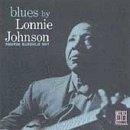It's all good ; A successful Bluesman
Tony Thomas | SUNNY ISLES BEACH, FL USA | 03/31/2004
(5 out of 5 stars)
"Lonnie Johnson was probably the most successful bluesman of the 1920s. He made hundreds of recordings, mostly blues with his unchallengable guitar, his great and always sexy and sometimes humorous voice, and on a few cuts, the violin, but others Jazz cuts with his musical partner Eddie Lang from Paul Whiteman's band (Lang had to take on a black blues pseudonym in order to mask the interracial character of the recordings),and with Jazzmen like Louis Armstrong and Duke Ellington. His work with Eddie Lang is considered the beginning of real Jazz guitar playing! Johnson became the Acme that Blues performers modeled themselves after as the 20s passed into the 1930s. Robert Johnson would like and tell people he was Lonnie's son, cousin, or nephew depending on whom he was talking to and many of Robert Johnson's guitar stylings are direct imitations of Lonnie's Blues work. Though there were times in the Depression when Lonnie Johnson left music for factory work, by the late 1940s and early 1940s he was back on top recording great blues in Chicago with Lil Hardin Armstrong and other members of RCA Victor's stable of blues greats in Chicago, with Jelly Roll Baker being his big hit. Johnson continued to have R & B hits into the late 1940s before alcoholism and health problems forced him out of music. This album marked his rediscovery and the beginning of another great series of recordings in the 1960s. He worked with blues stars, but also was quickly asked to record with Ellington once again. Johnson was always difficult for the ignorant folkie influences stereotypically thinking socalled blues fans to understand. Unlike their stereotype of a bluesman being an illiterate share cropper or a prisoner, Johnson was urban from New Orleans living in Chicago and New York and Philiadelphia most of his career. He had toured the world in vaudeville as a child fiddle player and dancer before he ever played gitar. He was musically educated and had been sought out by great Jazz
orchestras and soloists. Even this record where he was clearly not used to playing, illustrates his great ability to transmit feeling in his songs. I think in his rediscovery recordings in the 1960s *(Johnson died from complications from a automobile accident in Toronto where he lived and owned a nightclub in the early 1970s)were more mellow sensitive and wise that the musical masterpieces and guitar virtuosity he showed in the 1920s and 1940s. However, as they say on the talk shows, if it is by Lonnie Johnson, it's all good!!"


 Track Listings (12) - Disc #1
Track Listings (12) - Disc #1